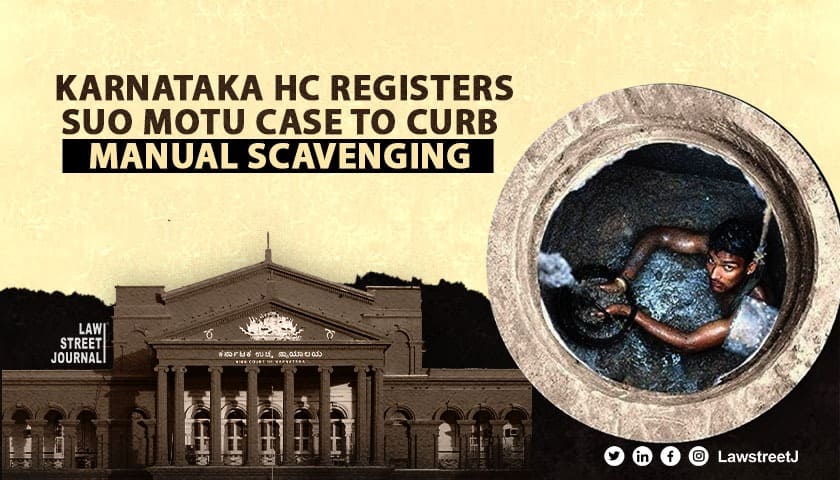Bengaluru: Noting that the evil practise of manual scavenging is still continuing within the state, the Karnataka High Court has taken suo motu cognizance of the same.
A Bench of Chief Justice Prasanna B Varale and Justice Krishna S Dixit noted that the practise was being continued despite the legislation - Prohibition of Employment as Manual Scavengers and their Rehabilitation Act, 2013 and Supreme Courts direction in 2014. And so, the high court cant be a mute spectator to this, the Bench said.
Centuries have rolled since then and seven decades have lapsed since the enactment of our Constitution; the evil practices in the society, associated with social status, have not withered away and it is mainly because of diseased mindset. The Parliament had enacted the Statute and the Rules have been promulgated thereunder; the Apex Court has time and again emphatically warned against the continuation of manual scavenging and despite all this, the pernicious practice which is derogatory to the mankind, still persists. This Court being a constitutional entity cannot be a mute spectator to this. We direct the Registry to register this news report as a suo motu PIL and build up the file.
Relying on a recent news article published in The New Indian Express titled Manual Scavenging Continues Despite Ban, the Bench was apprised that ex manual scavengers were still being asked by others if they could clean sewers.
The news item certainly shocks our conscience and bewilders us, the Bench observed.
The news item also pointed to how the Government werent taking effective steps to put an end to his inhumane practise. Heres an excerpt from the news article,
The Act came into effect in 2013 and the SC order prohibiting manual scavenging came in 2014. No human should clean human excreta. But the Government is not serious. It has done no campaigns. Today a person residing in the smallest of villages in Karnataka is aware of Swachh Bharat Abhiyan, but people still say they know nothing of the Manual Scavenging Act.
The Bench also thought it fit to refer to a vachana by Jagajyothi Basaweshwara, a great Social Reformer of 12th century, highlighting how everyone has an equal share and entitlement to all resources on the earth.
During the hearing, the Bench has strong observations to make. It isnt fair to let someone lead a bad life even if they are in financial difficulty, the Bench stated while adding that it is a shame on humanity.
Merely because a person takes birth in a particular community, carries a stamp of one caste, he is required to do this work (manual scavenging). Is it not a shame on humanity? Is this what we all are here for? Merely because somebody is facing financial difficulty, is he to lead a life as bad as an animal?
The Court then appointed Advocate Shridhar Prabhu as amicus curiae to assist the court and asked the Registry to submit a formal PIL petition by January 5. The matter will next come up on January 8.







![Karnataka High Court: Cabinet Rank Status Not Equivalent to Ministerial Position [Read Order]](/secure/uploads/2023/09/lj_2318_fc1b99b7-aeed-472b-836e-33750bedb394.jpg)


![Woman living in adultery cannot claim maintenance: Karnataka High Court [Read Order]](/secure/uploads/2023/10/lj_3083_Women_living.jpg)




